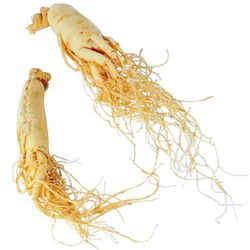- American ginseng is an herb. The root is used to make medicine.
Contents
Uses
- American ginseng is used for stress, to boost the immune system, and as a general tonic and stimulant.
- American ginseng is often used to fight infections such as colds and flu. There is some evidence that it might help prevent colds and flu and make symptoms milder when infections do occur.
- American ginseng is used for other infections including HIV/AIDS, infections of the intestine (dysentery), and particular infections (Pseudomonas infections) that are common in people with cystic fibrosis.
- Some people use American ginseng to improve digestion and for loss of appetite, as well as for vomiting, inflammation of the colon (colitis), and inflammation of the lining of the stomach (gastritis).
- American ginseng is also used for low iron in the blood (anemia), diabetes, trouble sleeping (insomnia), nerve pain, erectile dysfunction (ED), fever, hangover symptoms, attention deficit-hyperactivity disorder (ADHD), blood and bleeding disorders, cancer, painful joints, dizziness, headaches, convulsions, fibromyalgia, “hardening of the arteries” (atherosclerosis), memory loss, and as an anti-aging aid.
- You may also see American ginseng listed as an ingredient in some soft drinks. Oils and extracts made from American ginseng are used in soaps and cosmetics.
- Don’t confuse American ginseng with Siberian ginseng (Eleutherococcus senticosus) or Asian ginseng (Panax ginseng). They have different medicinal effects.
- Wild American ginseng is becoming rare because it is so popular and has so many uses. Some states have declared American ginseng a threatened or endangered species because so many people try to harvest it.
Benefits
- American ginseng contains chemicals called ginsenosides that seem to affect insulin levels in the body and lower blood sugar. Other chemicals, called polysaccharides, might affect the immune system.
Cautions
- American ginseng is POSSIBLY SAFE in adults and children when used short-term. It can cause some side effects including diarrhea, itching, trouble sleeping (insomnia), headache, and nervousness. In some people, American ginseng might also cause rapid heartbeat, increased blood pressure or decreased blood pressure, breast tenderness, vaginal bleeding in women, and other side effects. Uncommon side effects that have been reported include a severe rash called Stevens-Johnson syndrome, liver damage, and severe allergic reaction.
- Pregnancy and breast-feeding: American ginseng is POSSIBLY UNSAFE in pregnancy. One of the chemicals in Panax ginseng, a plant related to American ginseng, has been linked to possible birth defects. Do not take American ginseng if you are pregnant.
- Not enough is known about the safety of American ginseng during breast-feeding. Stay on the safe side and avoid use.
- Diabetes: American ginseng might lower blood sugar. In people with diabetes who are taking medications to lower blood sugar, adding American ginseng might lower it too much. Monitor your blood sugar closely if you have diabetes and use American ginseng.
- Hormone-sensitive conditions such as breast cancer, uterine cancer, ovarian cancer, endometriosis, or uterine fibroids: American ginseng preparations that contain chemicals called ginsenosides might act like estrogen. If you have any condition that might be made worse by exposure to estrogen, don’t use American ginseng that contains ginsenosides. However, some American ginseng extracts have had the ginsenosides removed (Cold-fX, Afexa Life Sciences, Canada). American ginseng extracts such as these that contain no ginsenosides or contain only a low concentration of ginsenosides do not appear to act like estrogen.
- Trouble sleeping (insomnia): High doses of American ginseng have been linked with insomnia. If you have trouble sleeping, use American ginseng with caution.
- Schizophrenia (a mental disorder): High doses of American ginseng have been linked with sleep problems and agitation in people with schizophrenia . Be careful when using American ginseng if you have schizophrenia.
- Surgery: American ginseng might affect blood sugar levels and might interfere with blood sugar control during and after surgery. Stop taking American ginseng at least 2 weeks before a scheduled surgery.
Interactions
Major Interaction Do not take this combination
- Warfarin (Coumadin) interacts with GINSENG, AMERICAN: Warfarin (Coumadin) is used to slow blood clotting. American ginseng has been reported to decrease the effectiveness of warfarin (Coumadin). Decreasing the effectiveness of warfarin (Coumadin) might increase the risk of clotting. It is unclear why this interaction might occur. To avoid this interaction do not take American ginseng if you take warfarin (Coumadin).
Moderate Interaction Be cautious with this combination
- Medications for depression (MAOIs) interacts with GINSENG, AMERICAN: American ginseng might stimulate the body. Some medications used for depression can also stimulate the body. Taking American ginseng along with these medications used for depression might cause side effects such as anxiousness, headache, restlessness, and insomnia.
- Some of these medications used for depression include phenelzine (Nardil), tranylcypromine (Parnate), and others.
- Medications for diabetes (Antidiabetes drugs) interacts with GINSENG, AMERICAN: American ginseng might decrease blood sugar. Diabetes medications are also used to lower blood sugar. Taking American ginseng along with diabetes medications might cause your blood sugar to go too low. Monitor your blood sugar closely. The dose of your diabetes medication might need to be changed.
- Some medications used for diabetes include glimepiride (Amaryl), glyburide (DiaBeta, Glynase PresTab, Micronase), insulin, pioglitazone (Actos), rosiglitazone (Avandia), chlorpropamide (Diabinese), glipizide (Glucotrol), tolbutamide (Orinase), and others.
Other Names
American Ginseng, Anchi Ginseng, Baie Rouge, Canadian Ginseng, Ginseng, Ginseng à Cinq Folioles, Ginseng Américain, Ginseng Americano, Ginseng d’Amérique, Ginseng D’Amérique du Nord, Ginseng Canadien, Ginseng de l’Ontario, Ginseng du Wisconsin, Ginseng Occidental, Ginseng Root, North American Ginseng, Occidental Ginseng, Ontario Ginseng, Panax Quinquefolia, Panax Quinquefolium, Panax quinquefolius, Racine de Ginseng, Red Berry, Ren Shen, Sang, Shang, Shi Yang Seng, Wisconsin Ginseng, Xi Yang Shen.
References
Source: WebMD, “Ginseng, American”, www.webmd.com/vitamins-supplements/

